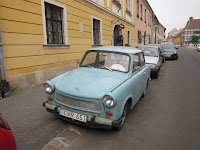The Romans had an important colony called Aquinsum until the mid-fifth century. They located and developed thermal water sources, which continue to be an important attraction today. In the mid-fifth century the Romans were forced to flea from the Huns, who occupied most of what is now Hungary until what we now consider the Hungarians (the Magyars) arrived in the year 1000. The years since have seen a pattern of building, destruction and rebuilding that would last until the mid-twentieth century and included the Mongols burning down what was then Buda and Pest in 1241, and periodic destruction by Turks, Habsburgs, and others, and then the Germans and Russians in World War II, and the Russians during the 1956 uprising. Walking around Budapest, one sees ample evidence of war damage, pockmarked buildings, and bullet holes in various state of repair.
Just looking around, one can imagine the splendor and opulence of pre World War II Budapest. It is evident however that fifty years of communist rule and decay has taken its toll. While some buildings have been beautifully renovated and would be at home in London, Paris or Rome, many buildings are in dire need of repair. Sleek Mercedes, Audis and other luxury cars roll down the streets next to Ladas, Trabants and Yugos belching black smoke. While most monuments to the Soviet era have been removed, there is still a monument to the so-called liberators of Budapest in 1945 (the Russians). Budapest is a place of many faces.
There is also the ugly past of anti-semitism, including the Arrow Cross movement of World War II, where fascist Hungarians turned out to be as effective at murdering Jews and others as the Nazis. Just today I came across a grim reminder, a swastika cut into a park bench, not representative of the Hungarian population of today, but still a grim reminder of its past.
Let's hope that the future holds peace and prosperity for Budapest.














No comments:
Post a Comment